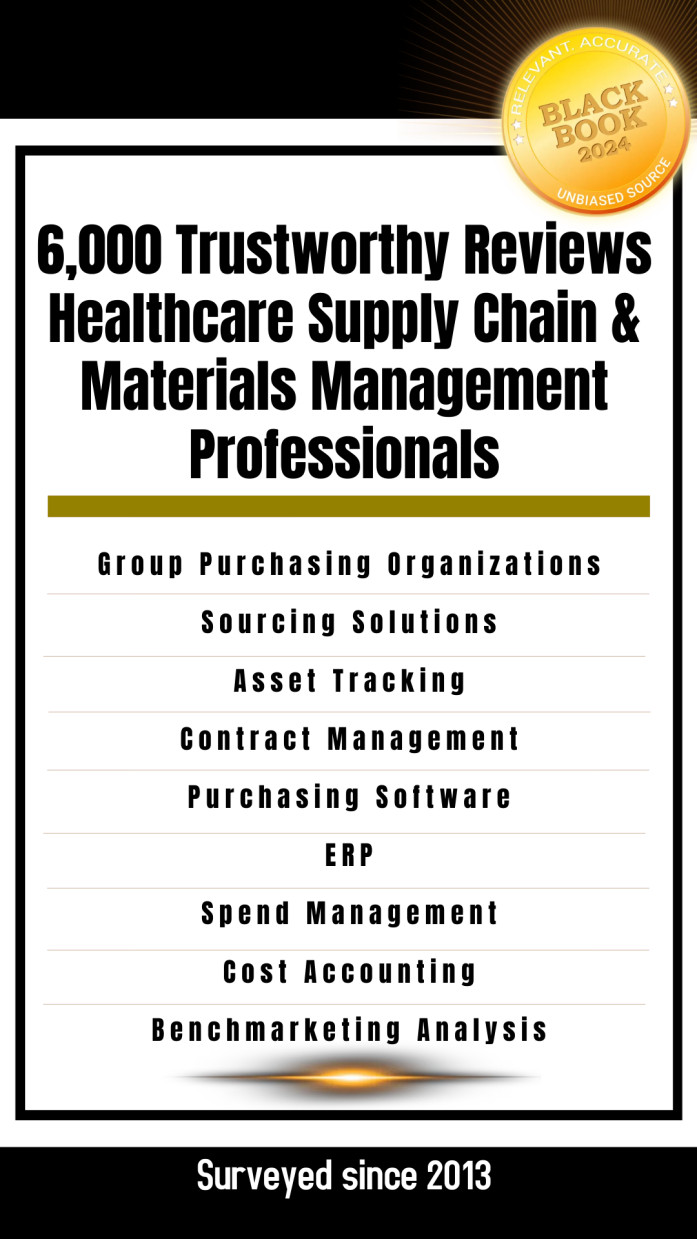Hospitals are not just outsourcing procurement but also forming deeper strategic partnerships with GPOs. These partnerships go beyond price negotiation to include strategic planning, supply chain optimization, and long-term cost-saving initiatives.
TAMPA, FL / ACCESSWIRE / September 16, 2024 / The trend of hospitals outsourcing to Group Purchasing Organizations (GPOs) has been gaining significant momentum in recent years, and 2024 is no exception, according to Black Book Research's annual poll of over 1,000 industry operations leaders.

"This surge in outsourcing is largely attributed to a confluence of factors, including escalating cost pressures, the increasing complexity of healthcare supply chains, and the constant drive for operational efficiencies," said Doug Brown, President of Black Book. "As healthcare systems face growing financial challenges and the need to streamline operations, GPOs are a vital solution for hospitals looking to reduce procurement costs while improving overall supply chain management."
According to the polling of 1,304 materials management, purchasing and operations professionals, the landscape of GPO outsourcing in 2024 reveals several important shifts that are shaping this dynamic trend. "Hospitals and health systems are leveraging GPOs not only to negotiate better pricing and contracts but also to navigate the ever-more intricate global supply chain challenges that have emerged in recent years," said Brown. "From managing vendor relationships to incorporating cutting-edge technologies like AI-driven procurement and real-time data analytics, GPOs are playing an increasingly strategic role in helping hospitals tackle the complexities of modern supply chain management."
Moreover, Black Book's research highlights how GPOs are supporting hospitals in other critical areas, such as regulatory compliance, sustainability, and risk mitigation. As health systems strive to meet new regulatory standards and improve supply chain transparency, GPOs are stepping in to help ensure compliance while offering hospitals access to sustainable, eco-friendly sourcing options.
"This trend is indicative of a broader shift, where hospitals view GPOs not just as purchasing partners, but as essential collaborators in navigating a rapidly changing healthcare environment," said Brown.
The report further underscores the growing importance of outsourcing in response to supply chain disruptions, labor shortages, and inflationary pressures. As supply chain disruptions continue to create challenges, hospitals are increasingly relying on GPOs to secure diversified supplier networks, mitigate risk, and ensure continuity of care.
Additionally, GPOs' ability to offer scalable solutions that can accommodate both large health systems and smaller hospitals alike makes them an attractive outsourcing option for a wide range of healthcare organizations, agree 77% of respondents.
In Q4 2024, this trend toward GPO outsourcing is poised to expand even further as hospitals continue to seek more cost-effective, resilient, and technologically integrated supply chain solutions. Black Book's findings highlight how GPOs are evolving to meet these needs, providing a clear indication that the role of GPOs in hospital supply chains will only grow more prominent in the years to come.
In response to rising supply chain costs, 93% of hospitals plan to rely on current or replacement GPOs by 2026 to cut expenses through bulk discounts and favorable contracts. Financial pressures, including shrinking margins and labor costs, make GPOs especially attractive, with 89% of small hospitals and 62% of larger hospitals planning to outsource some supply chain functions for greater cost efficiency.
GPOs also play a critical role in helping hospitals navigate global supply chain disruptions by providing access to diversified suppliers, reducing risks of shortages, and improving supply chain resilience. Additionally, GPOs are investing heavily in technology, offering digital platforms that automate procurement and provide real-time analytics, driving 46% of stand-alone and non-chain hospitals to explore outsourcing for these innovations.
Data-driven decision-making is another key benefit, as GPOs offer analytics tools that optimize purchasing and inventory management, with 92% of hospitals citing GPOs as essential partners for informed decision-making. Furthermore, 90% of hospitals are streamlining procurement by consolidating their vendor base, using GPOs to manage fewer suppliers, negotiate contracts, and ensure regulatory compliance.
Sustainability is emerging as a trend, with 13% of hospitals outsourcing eco-friendly procurement to GPOs to meet environmental goals. Additionally, 38% of hospitals are outsourcing the procurement of specialized, high-cost products, particularly for personalized medicine and specialty pharmaceuticals. GPOs are expanding their services to include logistics, sterile processing, and clinical outsourcing.
As regulations become more stringent, 13% of hospitals aim to outsource compliance management to GPOs, ensuring adherence to standards without significant internal investments. Industry consolidation is further accelerating this trend, with larger GPOs expanding through acquisitions, offering hospitals greater buying power and access to global supply chains.
Overall, hospitals are forming deeper strategic partnerships with GPOs, which now play a vital role in strategic planning, supply chain optimization, and long-term cost-saving efforts.
About Black Book
Black Book™, along with its founder and staff, maintain no financial interest in any GPOs, providers or vendors included in its surveys. In 2009, Black Book began polling over 2 million healthcare software and services users to gauge client experience. For methodology, auditing, resources, comprehensive research, and ranking data, contact us at research@blackbookmarketresearch.com or see www.blackbookmarketresearch.com
Contact Information
Press Office
research@blackbookmarketresearch.com
8008637590
SOURCE: Black Book Research
View the original press release on newswire.com.














